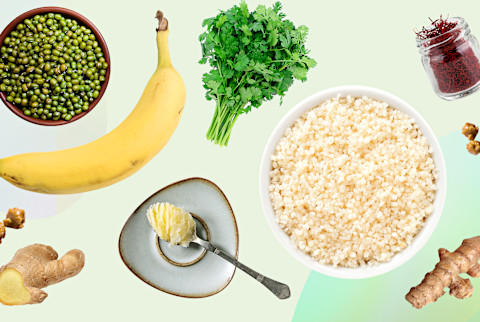
Eating for your dosha can make you feel more clearheaded, energetic, and satiated, according to internationally renowned ayurvedic healer Acharya Shunya. What better time to reap all of these benefits than at breakfast, when you're setting the tone for the rest of your day? We asked Acharya to share the best breakfast for every dosha, and here's what she delivered.
Vata Breakfast: Spiced Bananas
If you're vata dominant, heavy, oily, and bulky foods can help prevent brain fog and fatigue. The spices in my spiced banana recipe aid with digestion and prevent gas. Why banana? It's a power source of nutrition that works as a mild natural laxative. The earth and water elements of bananas counterbalance vata's air and space ones. They also ensure good elimination, as bananas are oily and add bulk. This is important since vata types are vulnerable to constipation.
This recipe is fast and easy to make. For convenience, pre-blend the spices and keep it in a shaker. You can also replace banana with (or add) sweet potato, figs, or ripe mangoes.
Ingredients
- 1 large or 2 medium ripe bananas
- ½ teaspoon ground cumin
- ¼ teaspoon rock salt
- ½ teaspoon lemon juice
- 1 teaspoon cilantro, minced
Method
- Peel and dice banana(s) into bite-size pieces.
- Sprinkle cumin, salt, and lemon juice over banana.
- Toss and mix well. Garnish with minced cilantro.
Pitta breakfast: Creamy Semolina
Wheat is perceived as an evil food these days, but for pittas, wheat can be sweet, cool, and soothing. It's a nutritious food that has been a staple in India and many other countries for centuries. Known for increasing vitality and immunity, wheat flour increases balance and supports digestion. In this recipe, both wheat and milk, which are cooling and nourishing, are combined to create my delicious creamy breakfast semolina. Feel free to substitute cow milk for goat or rice milk.
Ingredients
- ¼ cup wheat semolina
- 1 cup whole milk
- 1 tablespoon ghee (clarified butter)
- ¼ teaspoon ground cardamom
- 2 to 3 saffron threads (optional)
- 1 tablespoon slivered almonds (optional)
- 1 tablespoon raisins (optional)
- Cane sugar, to taste (1 to 2 teaspoons)
Method
- Dry roast the semolina in a pan until lightly toasted.
- Slowly add milk to the pan, stirring constantly to avoid lump formation.
- Add cardamom and saffron to the milk and wheat mixture. Bring it to a boil.
- Reduce heat and simmer for 8 to 10 minutes until a thin porridge-like consistency is achieved. If too thick, add more water.
- Add almonds and raisins.
- Serve immediately. Eat hot.
Kapha breakfast: Mung Bean Pancakes
For kapha types, mung bean pancakes are the perfect way to start the day. Mung beans are a highly underrated superfood, in my opinion. They have a unique composition of being light yet satisfying. These pancakes are a part of my daily breakfast routine. If your family is comprised of different doshas, you'll want to make it a part of yours, too, since all doshas can eat these pancakes every day.
Ingredients
- 1 cup yellow mung beans (soaked 3 hours or overnight)
- ½ teaspoon ground, roasted cumin
- ½ teaspoon rock salt
- ¼ teaspoon ground turmeric
- ¼ teaspoon grated fresh ginger
- ⅛ teaspoon asafetida
- 2 tablespoons ghee
Method
- Drain soaking liquid from mung beans and place in a blender. Blend on high speed for about 1 minute, adding a small amount of water (about 2 tablespoons) until smooth.
- Add cumin, salt, turmeric, ginger, and asafetida, and blend again briefly in the mixture with enough water so that the batter is a medium-thin consistency similar to wheat-flour pancake batter.
- Heat a small amount of ghee (½ to 1 teaspoon) in a skillet or griddle on medium heat.
- Drop a small ladle full of batter (¼ cup) onto griddle and spread in a circle. Cook on first side until edges start to brown and lift, about 5 minutes.
- Flip pancake with spatula and cook on second side until golden brown, about 3 to 5 minutes.
- Repeat steps 3 through 5 with the rest of the batter and ghee.

